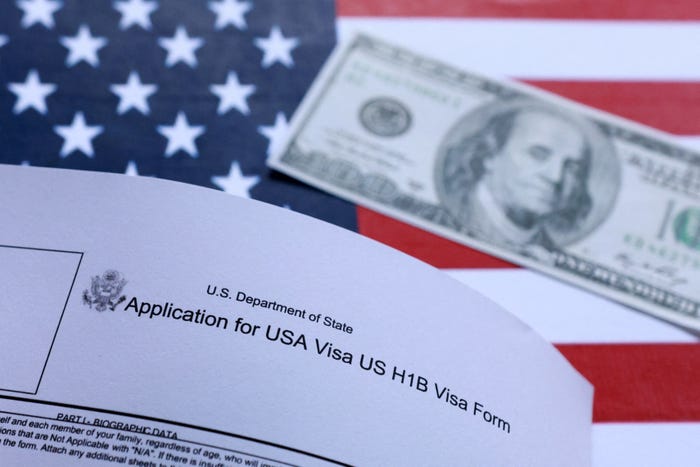UPDATE: The tech industry’s landscape is shifting dramatically as companies scramble to adjust to President Donald Trump’s newly implemented $100,000 H-1B visa fee. Reports confirm a surge in outsourcing inquiries as firms seek cost-effective solutions to maintain their workforce without the hefty fees.
Just announced, global HR firm Globalization Partners has reported a significant uptick in interest from businesses looking to hire talent abroad. With tech giants like Amazon previously securing more than 10,000 H-1B approvals in 2025 alone, the implications of this fee hike are profound, potentially reshaping the future of work.
Experts predict that outsourcing will become the norm, allowing companies to engage skilled workers in their home countries for lower wages, bypassing the expensive visa process. Nicole Sahin, CEO of Globalization Partners, revealed that around 25% of tech companies are already leveraging outsourcing for a competitive edge. “The globalization of work is really rampantly on the rise,” Sahin stated.
With major firms like Oracle, Meta, and Apple employing thousands of visa holders, the financial burden of the new fees has left many scrambling for alternative hiring strategies. Companies are increasingly opting to hire remotely, allowing employees to work from their home countries where living costs and wage expectations differ significantly.
As Sahin noted, competent engineers are returning to their home countries, where their salaries can stretch further, and their lifestyle improves. This shift raises critical questions about the future dynamics of employment and wage levels in both the U.S. and abroad.
The impact on wage structures could be significant. Han Stice, an associate professor at George Mason University, highlighted that while H-1B workers may initially earn less than their U.S. counterparts, their presence can actually drive up wage standards for local employees. “Outsourcing work may put upward pressure on wages in those countries, but the effects on local U.S. wages are still unclear,” he explained.
Currently, the average monthly wage in the U.S. is over $6,900, positioning it among the highest globally. In contrast, countries like India and China, which supply many H-1B visa holders, are not even in the top 50 for average wages.
Despite potential U.S. government penalties for offshoring jobs, experts like Devashish Mitra argue that companies will still find ways to profit, as the cost of labor in countries like India can be a fraction of U.S. rates. “Even with a 100% tax on what they pay foreign workers, it will still be financially beneficial for Big Tech companies,” Mitra stated.
As this trend unfolds, the implications for American workers seeking jobs could be dire. Many H-1B visa holders have previously accepted lower salaries simply for the chance at employment; however, as businesses establish offices abroad, the balance of power may shift. This could lead to better opportunities and bargaining positions for foreign workers.
With Google already operating in 60 countries and Meta and Amazon expanding their global reach, the landscape of employment is changing before our eyes. Companies are not just looking to fill positions; they are redefining where and how work gets done.
As the deadline for hiring under the new visa rules approaches, the urgency for businesses to adapt grows. Expect further developments in the outsourcing trend as firms race to secure top talent while navigating these new financial challenges.
Stay tuned for more updates as this story develops.
